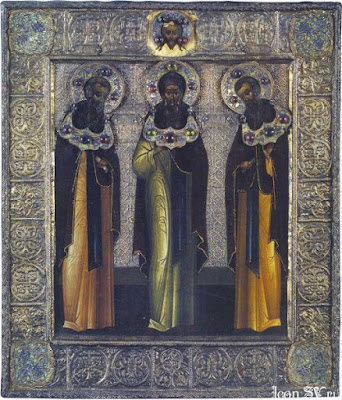Friday August 6/19 ns
Sts. Isaácios, Dalmátos, and Fáustus
Fast day

At first, St. Dalmátos was an officer during the reign of Emperor Theodosius the Great whom the emperor held in great esteem. When the spirit awakened in him, he despised all earthly things, resigned his rank and took his only son Fáustus and, with him, went to the community of St. Isaácios in the outskirts of Constantinople where they both were tonsured as monks. Dalmátos was completely devoted to a god-pleasing life for which the elder Isaácios rejoiced. When Isaácios approached the hour of death, he appointed Dalmátos as abbot in his place. Later, this community was named after him - the so-called Dalmátos. Dalmátos devoted himself to fasting, at times for forty days. By fasting he conquered the invisible demonic power. He participated in the Third Ecumenical Council [Ephesus 431 A.D.] and fought against the Nestorian heresy. Pleasing God, he died peacefully in the fifth century. His son Fáustus supported his father in everything and, after a God-pleasing life, died peacefully in this Dalmátos community.
1 Corinthians 11:8-23 KJV
8 For the man is not of the woman: but the woman of the man.
9 Neither was the man created for the woman; but the woman for the man.
10 For this cause ought the woman to have power on her head because of the angels.
11 Nevertheless neither is the man without the woman, neither the woman without the man, in the Lord.
12 For as the woman is of the man, even so is the man also by the woman; but all things of God.
13 Judge in yourselves: is it comely that a woman pray unto God uncovered?
14 Doth not even nature itself teach you, that, if a man have long hair, it is a shame unto him?
15 But if a woman have long hair, it is a glory to her: for her hair is given her for a covering.
16 But if any man seem to be contentious, we have no such custom, neither the churches of God.
17 Now in this that I declare unto you I praise you not, that ye come together not for the better, but for the worse.
18 For first of all, when ye come together in the church, I hear that there be divisions among you; and I partly believe it.
19 For there must be also heresies among you, that they which are approved may be made manifest among you.
20 When ye come together therefore into one place, this is not to eat the Lord's supper.
21 For in eating every one taketh before other his own supper: and one is hungry, and another is drunken.
22 What? have ye not houses to eat and to drink in? or despise ye the church of God, and shame them that have not? what shall I say to you? shall I praise you in this? I praise you not.
Saint Matthew 17:10-18 KJV
10 And his disciples asked him, saying, Why then say the scribes that Elias must first come?
11 And Jesus answered and said unto them, Elias truly shall first come, and restore all things.
12 But I say unto you, That Elias is come already, and they knew him not, but have done unto him whatsoever they listed. Likewise shall also the Son of man suffer of them.
13 Then the disciples understood that he spake unto them of John the Baptist.
14 And when they were come to the multitude, there came to him a certain man, kneeling down to him, and saying,
16 And I brought him to thy disciples, and they could not cure him.
17 Then Jesus answered and said, O faithless and perverse generation, how long shall I be with you? how long shall I suffer you? bring him hither to me.
18 And Jesus rebuked the devil; and he departed out of him: and the child was cured from that very hour.
ON SPIRITUAL KNOWLEDGE
AND DISCRIMINATION
by Saint Diadochos of Photiki
Whoever loves God far more than himself, or rather no longer loves himself but only God, no longer vindicates his own honor; for his sole wish is that the divine righteousness, which has accorded him eternal honor, should alone be held in honor. This he no longer wishes in a half-hearted way, but with the force of an attitude established in him through his deep experience of the love of God.
We should know, moreover, that a person energized by God to such love rises, at that moment, even above faith, since by reason of his great love he now senses consciously in his heart the One whom he previously honored by faith. The holy Apostle expresses this clearly when he says: 'Now there are three things that endure: faith, hope, love; but the greatest of them is love' (1 Cor. 13:13). For, as I have said, he who holds God in all the richness of love transcends at that moment his own faith, since he is wholly rapt in divine longing.





No comments:
Post a Comment